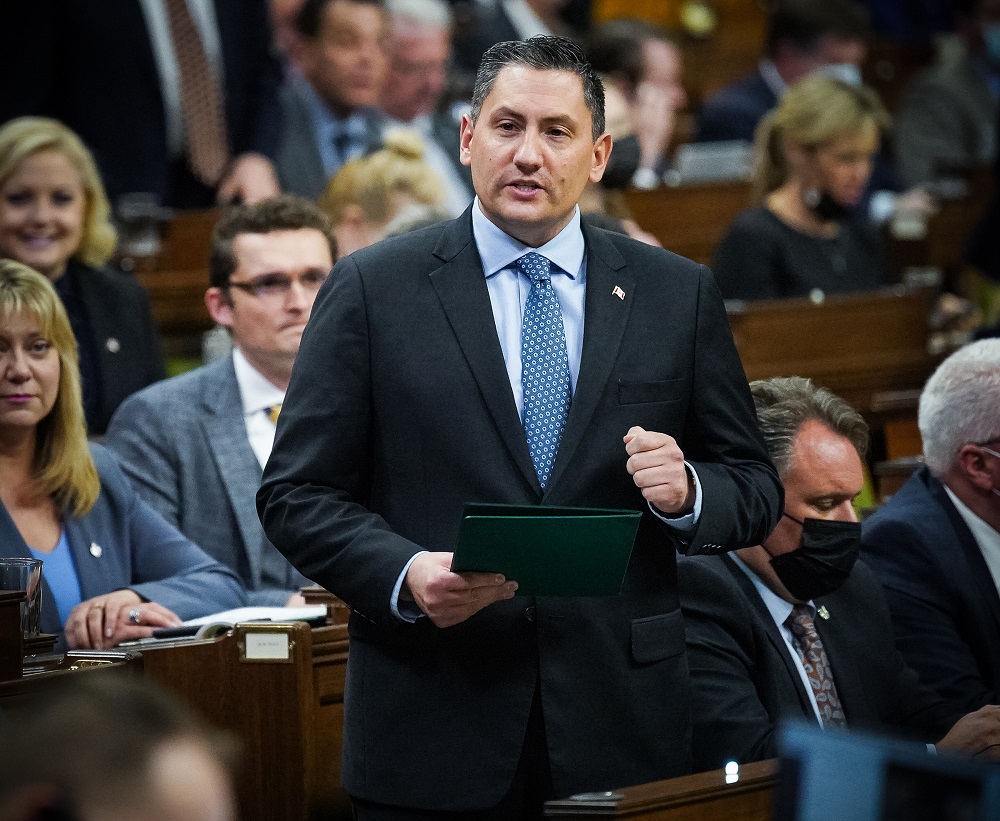MP Jamie Schmale said he’s starting to feel the pinch as inflation reached a new 40-year high in May, causing concern in households across the Highlands.
The basic MP salary is $182,600.
Statistics Canada reported June 22 that Canada’s inflation rate hit 7.7 per cent as of May 31, with increased prices at the pumps a major contributor. Gas prices rose by 12 per cent in May, and are up by 48 per cent compared to this time in 2021. The recent decision by Ontario Premier Doug Ford to lower the gas tax by 5.7 cents per litre and the fuel tax by 5.3 cents per litre, which came into effect July 1, will provide some relief, but only runs until the end of this year.
The federal agency said bloated food prices were also a significant factor to the rise, with grocery bills up by almost 10 per cent over the past year.
While not surprised by the numbers, Schmale said the failure of the federal government and the Bank of Canada to slow inflation in recent months is concerning.
“Many people haven’t seen this kind of price increase this quickly in their lifetimes. I’m worried about the people that are struggling to get by. It’s getting harder and harder to make life work,” Schmale said. “Any wage gains made over the past few years have been completely wiped out.”
He’s calling on the federal government to take a more serious approach to fixing the problem.
“One of the biggest drivers of this inflation is Ottawa printing money. Still, to this day, they continue to run the country on the credit card,” Schmale said. “When they found themselves in a hole during the pandemic… the printing presses started up, which inflated the currency. They threw a bunch of money into the atmosphere, which caused the crazy price inflation we’re seeing today.”
According to Statistics Canada, the national money supply has increased by more than 22 per cent since January 2020.
Getting a handle on inflation
Paul Beaudry, deputy governor of the Bank of Canada, said this record inflation is being driven by both domestic and international forces. He said the Canadian economy has recovered much quicker than the central bank anticipated, with GDP growth pushing 3.1 per cent through the first quarter of 2022. Job growth is also strong, with the national unemployment rate sitting at just above five per cent – a record low.
In many areas, demand is outstripping supply, which is causing prices to rise. Other factors, such as Russia’s invasion of Ukraine and an increase in lockdowns in China have exacerbated the issue, Beaudry said.
He noted inflation wasn’t a Canada-specific problem, with many other countries around the world also suffering. Inflation hit a new 40-year high in the UK in May, coming in at 9.1 per cent, with the likes of India (7.04 per cent), Germany (7.9 per cent), Spain (8.7 per cent) and the U.S. (8.6 per cent) also reporting bloated numbers.
Beaudry said the central bank plans to combat the issue by raising interest rates. The aim is to stop inflation before it becomes entrenched.
“Inflation becomes entrenched when it feeds on itself. Prices rise because other prices are rising and because the cost of labour is going up. In a situation like that, inflation becomes self-fulfilling because households and businesses expect that it will stay high or keep rising, and they act accordingly,” he said in a recent presentation delivered to the Gatineau Chamber of Commerce.
The Bank cut its lending rate to 0.25 per cent in early 2020 to support the economy throughout the pandemic, but in recent months has implemented several increases in an attempt to discourage borrowing and stave off inflation. Another hike is expected later this month, which would bring the bank’s key lending rate to 2.25 per cent – the highest benchmark in almost 15 years.
Beuadry said the end goal is to bring the rate of inflation down to around two per cent.
Schmale remains skeptical
Schmale said it’s hard to see any light at the end of the tunnel, with many experts predicting things will get worse before they get better. The MP said many families are suffering. He addressed Parliament June 24, sharing stories from constituents struggling to get by, with one resident reporting he’s having to work upwards of 60 hours a week just to keep a roof over his family’s head.
Schmale likened the Bank’s current directive to a conductor trying to regain control of a train destined for derailment. One group, the Canadian Centre for Policy Alternatives, believes it’s too late. They feel the Bank of Canada’s strategy will likely trigger another recession.
Schmale believes that can be avoided if the country’s natural resource sector can get back up and running. He’s also calling on the Liberals to cut back on what he considers frivolous spending, criticizing the announcement of a new five-year $5.3 billion investment to improve dental care services across the country.
Prime Minister Justin Trudeau has said the new dental program could benefit around 6.5 million Canadians.
“The government needs to get some fiscal sanity back into its conversations… Even before the pandemic, every single year from 2015 to 2020 [we incurred] tens of billions of dollars in new debt. Vanity projects and programs pushed through. Then, when the pandemic hit, we didn’t have the money, so we borrowed and we printed,” Schmale said. “All that did was put us into an even bigger hole.
“Unless Ottawa starts to make some decisions that actually help those on the ground, life is not going to get any easier,” Schmale said.





